Senate Bill
Summary: \Lead Sponsor: Katara Lockhart
Bill Text: I want the state to help do something about the major drug issue that goes on throughout the Untied States. I'm asking if the state could somehow lower the cost of the drug rehab. I personal believe that that is why people with drug issues dont go because they can not afford it.I would like for this to happen ASAP and throughout the United States before crimes get worse.
Subject(s): Drug Abuse
Actions: proceeded in front of the senate
Friday, September 28, 2012
Thursday, September 27, 2012
Social movement assignment number 9/27/12
To whom it may concern,
I am here today to talk to CNN about the major drug issue that seems to be going on not only in West Virginia, but everywhere in the United States. There are over 4 million people in the United States that are addicted to drugs. If the use of addicted drugs do not stop, who knows what could happen.
Not only adults and teens today are addicted but young kids in middle schools! I am a senior at Philip Barbour High School and I have came to realize that drug abuse is a MAJOR problem in society today. It was only a few months ago I was out somewhere and heard some kids (in middle school) talking about smoking marijuana. I was unsure on how to react to this.
Knowing some of those kids and who some of their family and friends, I wasn't to to surprise to hear them talk about it. Though it breaks my heart to hear them talk about that that is all they want to do when them get home from school. Some kids even take pills to school with them. They will do anything to get high. I haven't heard of any middle schoolers with pills as much as I have with the high schoolers.
I am stressing this because I know people whome have graduated already, have not gone to college, and have already been in jail numerous of times for drugs, theft, and child pornography. People will do anything to get another pound of marijuana, Gamma Hydroxy Butyrate, and cocaine.
I am here today to talk to CNN about the major drug issue that seems to be going on not only in West Virginia, but everywhere in the United States. There are over 4 million people in the United States that are addicted to drugs. If the use of addicted drugs do not stop, who knows what could happen.
Not only adults and teens today are addicted but young kids in middle schools! I am a senior at Philip Barbour High School and I have came to realize that drug abuse is a MAJOR problem in society today. It was only a few months ago I was out somewhere and heard some kids (in middle school) talking about smoking marijuana. I was unsure on how to react to this.
Knowing some of those kids and who some of their family and friends, I wasn't to to surprise to hear them talk about it. Though it breaks my heart to hear them talk about that that is all they want to do when them get home from school. Some kids even take pills to school with them. They will do anything to get high. I haven't heard of any middle schoolers with pills as much as I have with the high schoolers.
I am stressing this because I know people whome have graduated already, have not gone to college, and have already been in jail numerous of times for drugs, theft, and child pornography. People will do anything to get another pound of marijuana, Gamma Hydroxy Butyrate, and cocaine.
9/27/12 BR
School's nutrition sucks. High schoolers need more food thatn what they are being served!
Wednesday, September 26, 2012
9/26/12 BR
It's true, young adults are over weight but thats their fault. But school lunches do suck and theyre nasty! They need to give us good food and get an exercise program going for us! (:
Monday, September 24, 2012
9/25/12 BR
I think that if girls are stupid enough to be active without a condom they should be responsable enough to take care of their kid. And if they are not pregnant then that should scare them enough and make them realize that they are to young to be having sex or they should be smart enough to use a condom weather it feels good or not.
where do you fit?
You Are 50% Conservative, 50% Liberal
 |
|
|
This is one of the results from the quiz, How Liberal Or Conservative Are You?
|
Get HTML and BBCode
Here is your result in BBCode. Best for use in web forums.
Here is your result in HTML. Go ahead and post it with any of your accounts online.
where do you fit?
You Are 24% Capitalist, 76% Socialist
 |
|
|
This is one of the results from the quiz, Are You a Socialist or Capitalist?
|
where do you fit?
Quiz Results
The RED DOT on the Chart shows where you fit on the political map.

Your PERSONAL issues Score is
70%
Your ECONOMIC issues Score is
50%
According to your answers, the political group that
agrees with you most is...
Political Philosophies
Left (Liberal)
Liberals usually embrace freedom of choice in personal matters, but tend to support significant government control of the economy. They generally support a government-funded "safety net" to help the disadvantaged, and advocate strict regulation of business. Liberals tend to favor environmental regulations, defend civil liberties and free expression, support government action to promote equality, and tolerate diverse lifestyles.Libertarian
Libertarians support maximum liberty in both personal and economic matters. They advocate a much smaller government; one that is limited to protecting individuals from coercion and violence. Libertarians tend to embrace individual responsibility, oppose government bureaucracy and taxes, promote private charity, tolerate diverse lifestyles, support the free market, and defend civil liberties.
Centrist
Centrist prefer a "middle ground" regarding government control of the economy and personal behavior. Depending on the issue, they sometimes favor government intervention and sometimes support individual freedom of choice. Centrists pride themselves on keeping an open mind, tend to oppose "political extremes," and emphasize what they describe as "practical" solutions to problems.Right (Conservative)
Conservatives tend to favor economic freedom, but frequently support laws to restrict personal behavior that violates "traditional values." They oppose excessive government control of business, while endorsing government action to defend morality and the traditional family structure. Conservatives usually support a strong military, oppose bureaucracy and high taxes, favor a free-market economy, and endorse strong law enforcement.Statists (Big Government)
Statists want government to have a great deal of power over the economy and individual behavior. They frequently doubt whether economic liberty and individual freedom are practical options in today's world. Statists tend to distrust the free market, support high taxes and centralized planning of the economy, oppose diverse lifestyles, and question the importance of civil liberties.
18,999,432
THAT'S HOW MANY TIMES THE QUIZ HAS BEEN TAKEN SO FAR SINCE 1995
where do you fit?
Where You Scored On The Survey
Your answers suggest that you are a centrist. The yellow star shows generally where you fall within the centrist region of the Nolan Chart.
Social Networking
Tweet

Add a Tweet about your survey result to your Twitter account
Historic Results
See how others have answered the survey's questions.
What Does It Mean?
For an informal discussion about what the five camps (conservative, liberal, centrist, libertarian, and statist) represent check out this article.
Be A Columnist
All our readers are invited to become columnists here at the Nolan Chart. We welcome columnists from all political camps. The only requirement is that you adhere to our simple rules, which are designed to facilitate honest discussion of the issues by all without engaging in unjustified personal attacks. Click here to get started!
Your answers suggest that you are a centrist. The yellow star shows generally where you fall within the centrist region of the Nolan Chart.
Social Networking
Tweet

Add a Tweet about your survey result to your Twitter account
Historic Results
See how others have answered the survey's questions.
What Does It Mean?
For an informal discussion about what the five camps (conservative, liberal, centrist, libertarian, and statist) represent check out this article.
Be A Columnist
All our readers are invited to become columnists here at the Nolan Chart. We welcome columnists from all political camps. The only requirement is that you adhere to our simple rules, which are designed to facilitate honest discussion of the issues by all without engaging in unjustified personal attacks. Click here to get started!
where do you fit?
About The Political Compass™In the introduction, we explained the inadequacies of the traditional left-right line. If we recognise that this is essentially an economic line it's fine, as far as it goes. We can show, for example, Stalin, Mao Tse Tung and Pol Pot, with their commitment to a totally controlled economy, on the hard left. Socialists like Mahatma Gandhi and Robert Mugabe would occupy a less extreme leftist position. Margaret Thatcher would be well over to the right, but further right still would be someone like that ultimate free marketeer, General Pinochet. That deals with economics, but the social dimension is also important in politics. That's the one that the mere left-right scale doesn't adequately address. So we've added one, ranging in positions from extreme authoritarian to extreme libertarian. 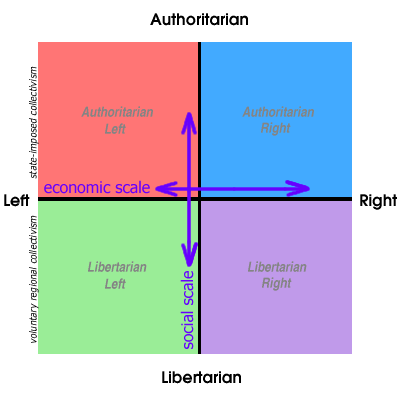 You can also put Pinochet, who was prepared to sanction mass killing for the sake of the free market, on the far right as well as in a hardcore authoritarian position. On the non-socialist side you can distinguish someone like Milton Friedman, who is anti-state for fiscal rather than social reasons, from Hitler, who wanted to make the state stronger, even if he wiped out half of humanity in the process. The chart also makes clear that, despite popular perceptions, the opposite of fascism is not communism but anarchism (ie liberal socialism), and that the opposite of communism ( i.e. an entirely state-planned economy) is neo-liberalism (i.e. extreme deregulated economy) 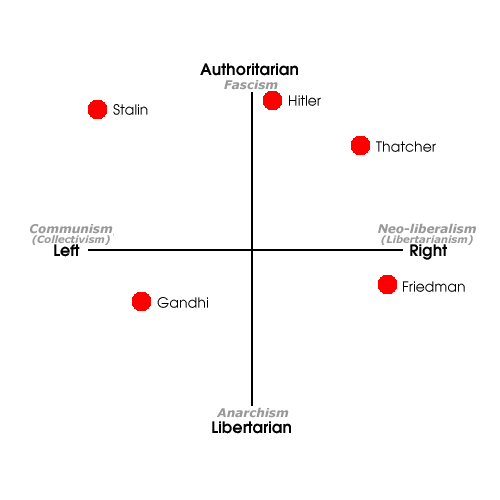 In our home page we demolished the myth that authoritarianism is necessarily "right wing", with the examples of Robert Mugabe, Pol Pot and Stalin. Similarly Hitler, on an economic scale, was not an extreme right-winger. His economic policies were broadly Keynesian, and to the left of some of today's Labour parties. If you could get Hitler and Stalin to sit down together and avoid economics, the two diehard authoritarians would find plenty of common ground. Your political compass
Economic Left/Right: 2.88
|
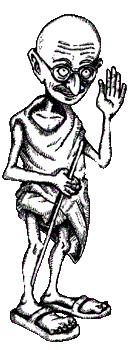 |
CLICK HERE TO PURCHASE YOUR OWN PERSONALISED POLITICAL COMPASS™ CERTIFICATE | 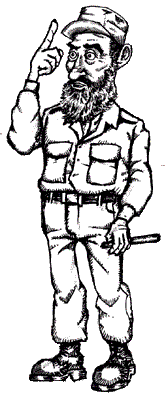
|
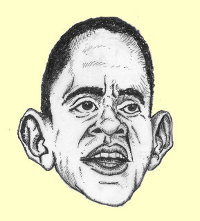 |
Join 26 caricatures of your most loved and loathed political
figures in a personalised colour certificate that you can load into your
browser, and print in moments.
It's beautifully designed by political cartoonist Ralph
Izzard and serves as a permanent record of your position on the Compass, and the
political company you keep.
It's also a means of helping us to maintain and develop the
concept and the site, while keeping it entirely free of heavy advertising.
See your score plotted on a chart with the US 2012 presidential candidates
Now you know where you are on The Political Compass™, you might like to explore the ideas of those with similar (or wildly differing) views on our Reading List.A Word about Neo-cons and Neo-libs
U.S. neo-conservatives, with their commitment to high military spending and the global assertion of national values, tend to be more authoritarian than hard right. By contrast, neo-liberals, opposed to such moral leadership and, more especially, the ensuing demands on the tax payer, belong to a further right but less authoritarian region. Paradoxically, the "free market", in neo-con parlance, also allows for the large-scale subsidy of the military-industrial complex, a considerable degree of corporate welfare, and protectionism when deemed in the national interest. These are viewed by neo-libs as impediments to the unfettered market forces that they champion.International Chart
A diverse professional team has assessed the words and actions of internationally known contemporary leaders to give you an idea of how they relate to each other on the political compass.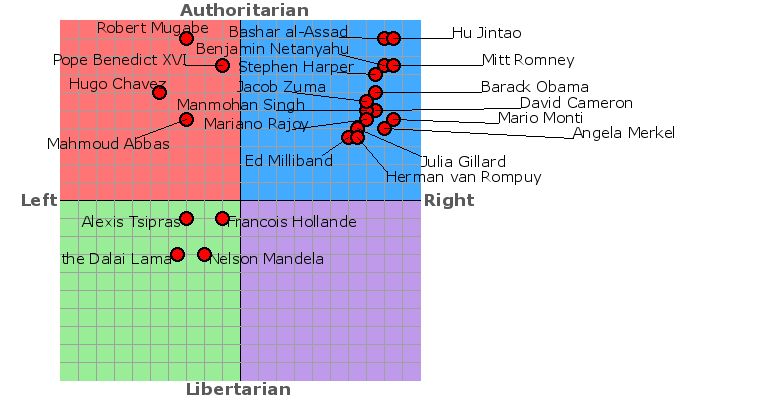
We regret the present exclusion of some major leaders, especially in the developing world. This is due to our inability so far to contact independent experts.
How You Can Help Us
A great deal of effort lies behind the development of The Political Compass, and the realisation of it in practical form. It has occasionally come to our attention that other sites have tried to exploit our work by copying it, adopting our name, or linking to us in a dishonest fashion.If you should come across any such sites, please let us know, so that we can take appropriate action.
A few critics believe that we should blow with prevailing political winds and narrow the actual parameters. Please see our FAQ 21.
Thanks from the Political Compass team.
US Election 2012
A few words about "The Extreme Right", and a look at the the UK political parties
ICONOCHASMS: How well do you know your political icons ?
New material is regularly added to The Political Compass - please keep coming back !This website copyright © Pace News Limited 2001-2012. All rights reserved. Reproduction in whole or in part in any medium without prior written permission strictly prohibited.
Advertisements are placed here by Google, and in no way
imply endorsement by The Political Compass™ or Pace News Ltd.
where do you fit?

Where Do You Fit?
The Political Party Quiz
Based on your responses here is where you fit…




































Compare yourself to other demographic groups by:
Overall, your political values are closest to those of a… Moderate Democrat
Subscribe to:
Comments (Atom)

